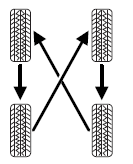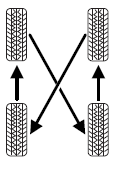Tire rotation

Rotating your tires at the recommended interval (as indicated in the Scheduled Maintenance chapter) will help your tires wear more evenly, providing better tire performance and longer tire life.
Х Front-wheel drive (FWD) vehicles (front tires at top of diagram)

Х All-wheel drive (AWD) vehicles (front tires at top of diagram)

Sometimes irregular tire wear can be corrected by rotating the tires.
Note: If your tires show uneven wear ask an authorized dealer to check for and correct any wheel misalignment, tire imbalance or mechanical problem involved before tire rotation.
Note: Your vehicle may be equipped with a dissimilar spare tire/wheel. A dissimilar spare tire/wheel is defined as a spare tire and/or wheel that is different in brand, size or appearance from the road tires and wheels. If you have a dissimilar spare tire/wheel it is intended for temporary use only and should not be used in a tire rotation.
Note: After having your tires rotated, inflation pressure must be checked and adjusted to the vehicle requirements.
See also:
Deactivating/activating autounlock feature
Your vehicle comes with the autounlock features activated; there are four
methods to enable/disable this feature:
Х Through your authorized dealer,
Х by using a power door unlock/lock sequence, or ...
Trailer tow connector (vehicles equipped with a Class II trailertow/prep package)
The trailer tow connector is located under the rear bumper, on the
driverТs side of the vehicle.
Refer to the following chart for information regarding the
factory-equipped trailer tow connecto ...
Power door locks
Х Press the
control to unlock all
doors.
Х Press the
control to lock all
doors. ...
